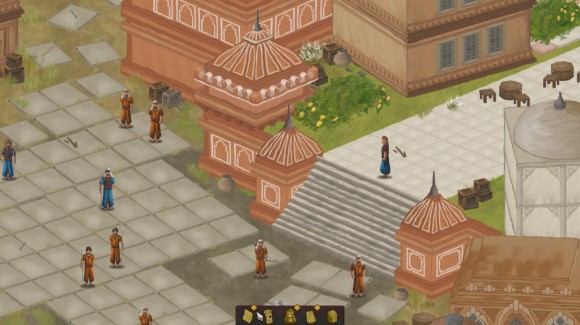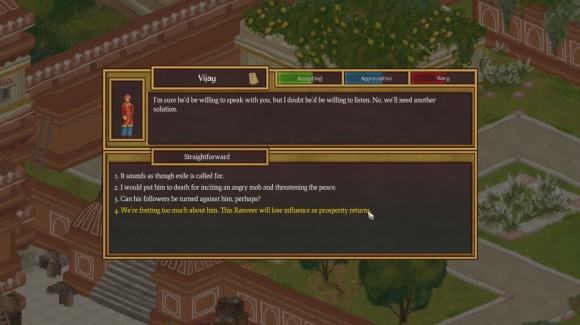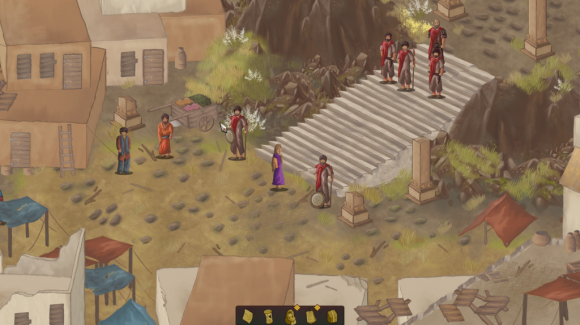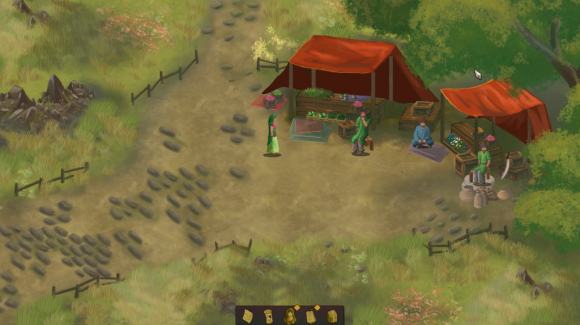Unrest comes to us by way of developer Pyrodactyl Games, and is touted as an RPG set in a fantasy version of Ancient India. It’s a game about choices, and how those choices not only affect you but other individuals including ones you’ve yet to even meet. Unrest is built on an interesting premise, and even chooses a relatively unique and unexplored way of dropping you into the narrative, but although the game is at times interesting it unfortunately fails to truly suck you in and really be amazing.
The narrative style of the game calls to mind other titles that have a “generational” tale to tell, such as Saga Frontier 2 or Eternal Darkness, where each character’s smaller struggle lends overall to the much larger story. The issue Unrest faces that most other titles using similar storytelling methods do not, is the fact you never get a chance to really get acquainted with the characters. It always feels like you’re dropped into that character’s story just a little too late, and often find yourself exiting way too soon. Characters are frequently introduced with a brief text prologue to let you know who that person is and exited out with a similar epilogue that usually ends in “What will their fate be? Maybe we’ll never know…”. While it is interesting to see how one person’s story affects the next with each one dragging you deeper into the political mire of the world, I would have liked a chance to grow attached to the characters and really care about them. The only character I found myself even partially invested in was royal princess Asha, and that’s only because the game gave me constant exposure to her and her plight by returning to her between other characters, not so much because I found my own deeper attachment to the princess herself.
In that same vein, each character you play as serves as a silent protagonist. You make choices on their behalf, and while this is far from out of place for an RPG, being introduced to a quick secession of actors with no real incentive to play them one way or the other lead me to choose actions for them just for the hell of it, as opposed to trying to adhere to realistic decisions or being even tempered in my approach. One example is Tanya, a villager sentenced to a marriage she didn’t want, who I chose to play as a rebellious, snarky teenager simply because I was tired of being agreeable. Or there’s quite headscratchingly one of the villains I end up playing as later on, who I just played as a bumbling oaf because I was equally fatigued of trying to be the effective leader.
One cool thing I did enjoy however is the fact your own actions unlock character traits, rather than traits affecting your characters actions. If I decided maybe Naga’s decided to eat a little more than humans, I’d get the Naga Sympathizer trait. Trading one ill gotten gain for the other might net me the Opportunist trait. That being said traits feel a bit more like achievements than stats, as at least as far as I could tell having them didn’t have a real direct impact on gameplay.
It probably won’t take long before you realize the “trick” of Unrest is that choices made with one character will affect the next, you’re just going to use each character to work for the overall outcome you want to see. This can mean seeing the true royal family’s return to the throne, the evil usurpers cull your city’s troublesome slums, or engineering for Naga superiority. While this is certainly an investment into the story, it feels like a shallow one, as you’re doing it to execute plot and not so much because you’re truly excited about the goings on.
While it touts itself as an RPG, Unrest has much more of a visual novel feel. A choose your own adventure full of political problems for you to either solve or exasperate. Though dialogue is an easy read and it doesn’t “feel” text heavy, nearly all interactions in the game are text driven. Inventory means very little outside of a few plot points, as stated earlier stats don’t seem to do a whole much, and even the advertising blurb for this game tells you violence will be used very little. The only real interaction with the game outside of dialogue is the ability to move from one place to another by clicking on the screen. None of this is bad mind you, though anyone interested in purchasing the game should know what they’re in for.
Now there’s not much else to see outside of how the political plot boils down. The graphics are functional, but don’t feel overly inspired, and all characters from the game’s central cast to NPCs tend to feel very same-y. As you’d expect there are a few sitar driven tracks in the game, though they’re awfully short and placed on an obvious loop that serves to the game’s detriment. If you do pick it up take your time with the quests and reading the game’s journal entries and lore, because you’re truly in this one just for the story.
It’s an interesting little title, though the asking price for such a limited experience seems a little steep. One playthrough will likely take you between 2 to 3 hours, though it may be worth going back just to see the different choices you could make. Witnessing the cause and effect of the overarching plot is the draw here, that being said I really do wish the game allowed me to invest deeper into the characters and care about the city’s plight. I also wish choices felt a bit harder, as opposed to me making them to purposefully manipulate the story line or because I was a little bored of how I had been playing the game thus far. As a small tale of politics and intrigue Unrest works for what it is.










